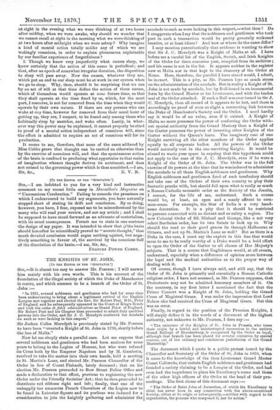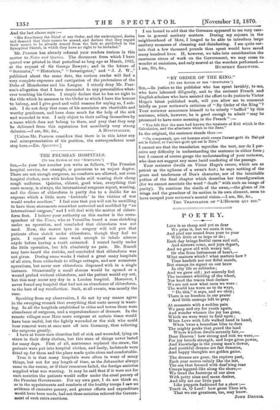THE KNIGHTS OF ST. JOHN.
[TO THE EDITOR OF THE ..EPEOTATOR.1 gSIE.,It is almost too easy to answer Mr. Pearson ; I will answer Um mainly with his own words. This is his account of the 'foundation of the illegal society of which the Duke of Manchester is centre, and which assumes to be a branch of the Order of St. -John :— " In 1931, several noblemen and gentlemen who had for some time been endeavouring to bring about a legitimate revival of the English -Longue met together and elected the Rev. Sir Robert Peat, D.D., Prior of England, and he subsequently appeared in the Court of King's Bench and took the oaths de ftdell administrations as Grand Prior of England. .Sir Robert Peat and his Chapter then proceeded to admit duly qualified persons into the Order, and Sir J. 0. Meredyth conferred the accolade on such as were lacking in this respect."
:Sir Joshua Cones Meredyth is previously stated by Mr. Pearson to have been "created a Knight of St. John in 1798, shortly before
the loss of Malta."
Now let me simply state a parallel case. Let me suppose that :several noblemen and gentlemen who had been anxious for some Tears to belong to the Legion of Honour, but who were refused its Cross both by the Emperor Napoleon and by M. Gambetta, -resolved to take the matter into their own hands, held a meeting in St. Martin's Lane, and elected Mr. Pearson Chancellor of the Order in lieu of Count Flahault, lately deceased ; that on his .election Mr. Pearson proceeded to Bow Street Police Office and made a declaration to that effect, previous to registering the new 'Order under the Friendly Societies' Act; that he then proceeded to -distribute red ribbons right and left; finally, that one of the unhappily too numerous French Chevaliers of the Legion now to be found in Leicester Square and its purlieus was induced for a consideration to join the knightly gathering and administer the
accolade to such as were lacking in this respect,—what then ? Do I exaggerate when leap that the noblemen and gentlemen who took
part in such a transaction would be pretty generally reckoned lunatics, or at least idiots? And how or where do the cases differ? I may mention parenthetically that evidence is wanting to show
that Sir J. C. Meredyth was a Knight of Malta at all. I have before me a careful list of the English, Scotch, and Irish Knights of the Order for three centuries past, compiled from its archives ; and his name is not in the list. It appears neither in the register now at Malta nor in that kept in the chancery of the Order at Rome. Here, therefore, the parallel I have stated would, I admit, be inexact. This is a pity, as Mr. Pearson lays so much stress on the administration of the accolade. But in reality a Knight of St. John is not made by accolade, but by Bull issued in an immemorial form by the Grand Master or his Lieutenant, and with the leaden seal of the Order attached. If such a Bull was ever issued to Sir J. C. Meredyth, then all record of it appears to be lost, and there is accordingly no proof of even so slight a connecting link between the Duke of Manchester's Society and the Order. I need hardly say it would be of no value, even if it existed. A Knight of
Malta no more possesses the power of conferring the Order with- out special authority from the Grand Mastery than a Knight of the Garter possesses the power of investing other Knights of the Garter without the Queen's leave. The imaginary case of one Knight surviving all the other members of the Order applies equally to all corporate bodies. All the powers of the Order would naturally vest in the one surviving Knight. It would be
absurd to waste your space in arguing that this hypothesis could not apply to the case of Sir J. C. Meredyth, even if he were a Knight of the Order of St. John. The Order was in the full exercise of its powers at the time that he was induced to administer the accolade to all these English noblemen and gentlemen. Why
English noblemen and gentlemen fond of such tomfoolery should not take one of the Orders of their own country to play their fantastic pranks with, but should fall upon what is really as much a Roman Catholic monastic order as the Society of the Jesuits, I cannot, for the life of me, understand. Such a course would be, at least, an open and a manly affront to com- mon-sense. For example, the Star of India is a very hand- some decoration. It is a pity that it should be restricted to persons connected with so distant and so sultry a region. The new Colonial Order of SS. Michael and George, like a not very select Sardinian order, has its two Saints to look up to. Why should the road to their good graces lie through Melbourne or Ottawa, and not up St. Martin's Lane as well? But as there is a Duke in the case, I must say the exploit in this line that would seem to me to be really worthy of a Duke would be a bold effort to open the Order of the Garter to all classes of Her Majesty's
subjects. That is a course that Englishmen would, at all events, understand, especially when a difference of opinion arose between the legal and the medical authorities as to the proper way of
dealing with it.
Of course, though I have always said, and still say, that the Order of St. John is primarily and essentially a Roman Catholin
religious order, I have not assumed, as Mr. Pearson supposes, that Protestants may not be admitted honorary members of it. On the contrary, in my first letter I mentioned the fact that the Prince Consort was a Knight of St. John, holding the Grand Cross of Magistral Grace. I was under the impression that Lord
Nelson also had received the Cross of Magistral Grace. But this
was an error.
Finally, in regard to the position of the Prussian Knights, I will simply define it in the words of a document of the highest authority, not unknown to Mr. Pearson, I dare say :—
" The existence of the Knights of St. John in Prussia, who trace their origin by a lawful and uninterrupted succession to the antient Grand Bailiage of Brandenburg, is recognized by the Order as legal, although that branch has been placed for several centuries, by special reasons, out of the ordinary and continuous jurisdiction of the Grand Mastership."
The document which I quote is a public protest issued by the
Chancellor and Secretary of the Order of St. John in 1858, when it came to the knowledge of the then Lieutenant Grand Master Count Colorado, that certain English noblemen and gentlemen had founded a society claiming to be a League of the Order, and had even had the impudence to place his Excellency's name and those
of the other high officers of the Order at the head of their pro- ceedings. The first clause of this document says :— " The Order of Saint John of Jerusalem, of which his Excellency is chief, has never been in any connection with the above-mentioned Society, either at its origin or subsequently,—neither with regard to its organization, the persons who composed it, nor its action." And the last clause says :—
" His Excellency the Chief of our Order, and the undersigned, desire and demand that their names be erased, and declare that they regard their names to be already erased from the lists so published in the Synoptical Sketch, in which they have no right to be included."
Mr. Pearson has already referred your readers durious in this matter to Notes and Queries. The document from which I have quoted WAR printed in that periodical so long ago as March, 1863, at the request of Sir George Bowyer ; and in the letters of " Scrutator," " Historicus," "Investigator," and "J. J. W.," published about the same date, the curious reader will find a very complete exposure and castigation of the pretensions of the Duke of Manchester and his Langue. I utterly deny Mr. Pear- son's allegation that I have descended to any personalities what- ever touching his Grace. I simply declare that he has no right to the title which he assumes in the Order to which I have the honour -to belong, and I give good and valid reasons for saying so, I sub- mit. I do not deny that some of his associates are charitable and worthy gentlemen, and have done much for the help of the sick and wounded in war. I only object to their calling themselves by a name which does not belong to them, and pray that they may be delivered from this mysterious but manifestly very strong delnsion.—I am, Sir, &c., A HOSPITALLER. [Unless Mr. Pearson considers that there is in this letter any real misrepresentation of his position, the correspondence must stop here.—En. Spectator.]



































 Previous page
Previous page